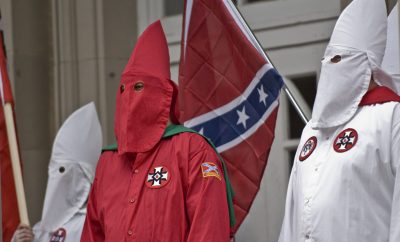 Image courtesy of [Brad Greenlee via Flickr]
Image courtesy of [Brad Greenlee via Flickr]
Entertainment
Interracial Marriage is Front and Center this Oscars Season
Riding high off the success of Ava DuVernay’s “Selma,” David Oyelowo is once again stepping forward in an Oscar contender biopic. This time he portrays Seretse Khama, Botswana’s first president, who caused waves both in Botswana and the UK when he married Ruth Williams, a white Briton played by Rosamund Pike. “A United Kingdom,” which depicts their marriage against the backdrop of British imperialism, digs into attitudes regarding interracial marriage in both black and white communities. It will be easy for certain viewers to applaud the love story and then reassure themselves that we have come so far since the 1940s–which is exactly why Jeff Nichols’ “Loving“ is so necessary. “Loving,” starring Ruth Negga and Joel Edgerton, tells the story of Mildred Jeter and Richard Loving, who were arrested and imprisoned for their interracial marriage in Virginia in 1967. The suit they brought against the state went all the way to the Supreme Court, which ultimately declared prohibiting interracial marriage unconstitutional. “A United Kingdom” introduces the unique space that interracial love occupies in our history while “Loving” reminds audiences exactly how recent legal acceptance of that love is.
“Loving’s” debut at Cannes and “A United Kingdom’s” spot opening the London Film Festival essentially guarantees that they will be at least contenders for Oscar nominations. The joy of Oscar season is that films that are difficult to market in other times of year are thrust onto the public radar. These two films reveal too much about the gritty reality of racism to be written off as sweet romances like last year’s “Brooklyn“ (which depicted the difficulties of two lovers from different ethnic backgrounds but who were both white) yet they also are concerned with love stories so they will not necessarily draw crowds who want heavy hitting drama in the style of “Spotlight” or “The Revenant.” Neither director has quite enough star power to attract an immediate, built-in audience. Amma Asante, director of “A United Kingdom,” already proved herself a master of portraying the complexity of interracial relationships with her film “Belle” in 2013 but Jeff Nichols, director of “Loving,” has previously worked largely in the thriller realm. “Variety’s” review of “Loving” at Cannes describes Loving as “too damn polite” and “The Guardian” labeled the film “underpowered.” Reviews of “A United Kingdom” have yet to hit the presses.
When looking at the contenders for the 2017 Oscars, these films stand apart–but while that makes them the answer to our wish for cinema that reflects our experience, it also paints a target on them. These films will exist between our traditional concepts of cinema–not classically romantic enough to be considered part of the old guard but not angry enough to be revolutionary calls to action.
In the wake of #OscarsSoWhite, critics and the general public alike are looking for films that will starkly contrast those of last year. There is a desire for more actors and directors of color, more diverse stories and more contemporary storylines. These two films bring all of those elements to the table but the weight that will be placed on them is monumental–they will be expected to be perfect to make up for the mistakes of last year. Asante and Nichols face more pressure than any other directors because they are telling true stories but they have to package them in a precise way: not harsh enough to frighten the critics but not sweet and revisionist in a way that will anger viewers aching in the wake of a summer of violence.
In the search for this perfection, there is a distinct threat that critics will judge these films more harshly than if they were love stories about a couple of the same race. They will be pulled apart because they fail to represent the full scope of interracial marriage (interracial love includes many races beyond black and white), their use of “brand name” Hollywood stars (although Negga could still be considered relatively unknown) and, of course, the fact that they center on interracial relationships–why is Hollywood not making more films concerning love between two people of color? Interracial couples and families deserve to see themselves reflected on screen, to have attention paid to their challenges and history–yet this year, when every Oscar contender with a person of color in the lead role is marked as reactionary in the context of #OscarsSoWhite, more attention will be paid to whether critics approve of the films than to whether the viewing public finds joy in seeing interracial love at the multiplex.
It is rare for a film to strike the perfect balance, to satisfy every viewer while making a larger statement about our culture without being defeatist or romanticist. A film that truly achieves that may come about once every decade–and now we are asking two films to do exactly that within the same year.








Comments